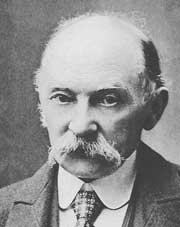









|
Chapter Eight English Literature of the
First Half of the
Twentieth
Century
I. English Poetry from 1900s to 1950s
1.Thomas Hardy (1840-1928)
 Thomas Hardy is one of the very few writers in English literary history who
have been great in both novel and poetry. In the thirty years before his
death in 1928, Hardy published all together more than 900 poems and a long
verse drama, The Dynasts (1904-1908), which is also the longest poem
and the longest play script in English literature. After Jude the Obscure
published in 1896, Hardy was irritated by the malicious criticism at that
time to such an extent that he ceased writing novels, and at the age 58,
turned entirely to poetry.
Thomas Hardy is one of the very few writers in English literary history who
have been great in both novel and poetry. In the thirty years before his
death in 1928, Hardy published all together more than 900 poems and a long
verse drama, The Dynasts (1904-1908), which is also the longest poem
and the longest play script in English literature. After Jude the Obscure
published in 1896, Hardy was irritated by the malicious criticism at that
time to such an extent that he ceased writing novels, and at the age 58,
turned entirely to poetry.
In fact, Hardy had written poetry from his outset of his
literary career. He began to write poems at 25, but did not receive any
recognition until Wessex Poems was published in1898. This first
anthology of Hardy was a combination of both his earlier poems in 1980s and
some new ones. This great poetic output dealt with a variety of themes,
ranging from impersonal narratives to highly personal emotional pieces, from
philosophical speculations to comments on national or international events.
In the anthology, Hardy tried on many different experiments in meter and
language. He wrote sometimes in ballad meter with short lines while
sometimes in rhymes with occasional alliterations, sometimes in spontaneous
language while sometimes in eccentric diction.
After Wessex Poems, Hardy successively published
Poems of the Past and the Present (1902), Time’s Laughing Stocks
(1909), Satires of Circumstance (1914), Moments of Vision
(1917), Late Lyrics and Earlier (1922), Human Shows (1925) and
Winter Words (1928). He died on January 10, 1928 and was buried in
Westminster Abbey.
Among these collections, Satires of Circumstance and
Moments of Vision are the best. The 266 poems in these two
anthologies were written in eight years when he was more than 70-year-old.
Till then, Hardy had completely mastered poetry as a way to express his
various ideas and feelings. In the poems, Hardy touched many subjects,
including war, pilgrimage, love, country life, and so on. Among them, the
most famous were the poems of 1912-13, which “taken as a whole, make one of
the glories of English literature. As expressions of love, regret,
tenderness, need, they are fit to stand beside Shakespeare’s sonnets.” (John
Wain)
These poems of 1912-13 were in memory of his first wife
Emma who died in 1912 and with whom Hardy remembered poignantly for their
earlier love and later alienation.
In “A Broken Appointment”, Hardy blamed Emma for a broken appointment in the
past. He wrote
You love not me,
And love alone can lend you loyalty;
---I know and knew it. But, unto the store
Of human deeds divine in all but name,
Was it not worth a little hour or more
To add yet this: Once you, a woman, came
To soothe a time-torn man; even though it be
You love not me?
A year after her death, in “The Voice”, the poet seemed
to hear her voice once again and saw his meeting with her once in the past:
Let me view you, then,
Standing as when I drew near to the town
Where you would wait for me: yes, as I knew you then,
Even to the original air, blue gown!
The most poignant poem of the lost was “The Walk”, in
which Hardy showed how much he missed her in simple language:
You did not walk with me
Of late to the hilltop tree
By the gated ways
As in earlier days.
All these finest poems of Hardy were written in
so sincere yet plain and beautiful language.

|
![]()
![]()